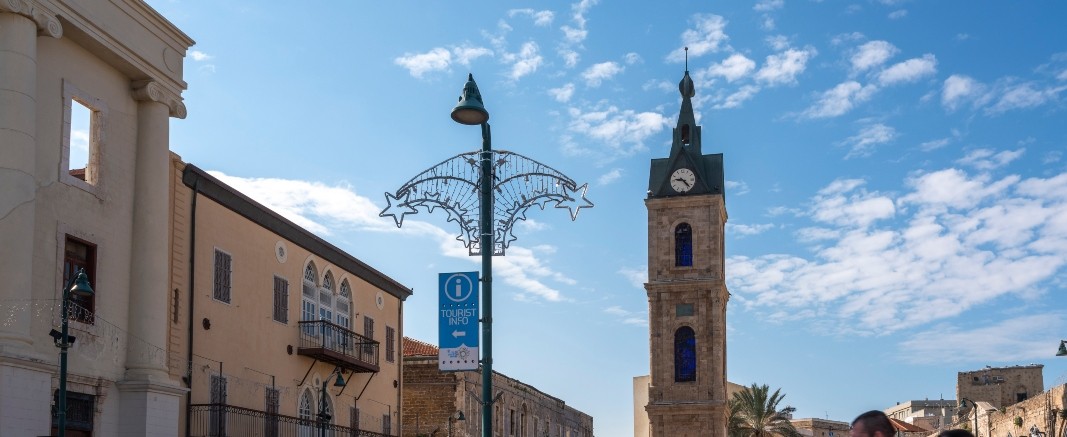They call Yafo (Jaffa) “the Bulgarian capital of Israel” even though there are practically no young people left there who are descendants of immigrants from Bulgaria. It is thought to be one of the oldest settlements in the world with archaeological finds dating back to the 18th century BC. According to ancient Greek legends, it is here that Perseus freed Andromeda. The settlement was one of Israel’s most important ports in ancient times, and it is mentioned in the bible.
In our day Yafo is part of Tel Aviv (since 1949), and is the city’s oldest quarter. Here, you can hear Bulgarian spoken or try out Bulgarian cuisine. There are two “Bulgarian” places here – Vlado’s café and Lambo’s tavern, and in both different destinies, hopes and disappointments intertwine. But because of the quarantine over the coronavirus the tavern is closed, and the café has been transformed into an open-window store. And the place still has its customers because it is only here that one can buy Bulgarian products – lyutenitsa (chutney), canned meat “Rusensko vareno”, pate, and even Bulgarian boza. It is also a place where one gets to meet many of our fellow countrymen who have chosen Israel as the place to make a living.
One of them is Rositsa Bozhinova, an accountant, who has been working in Israel for 23 years. She started out as a housekeeper, but after the second woman she was looking after died, she stayed on and continued working even though she is undocumented. Now she lives with an elderly family as a domestic worker in exchange for a free room. She cannot return to Bulgaria because she does not have a work visa.

“What I need is time off for a very, very long time, one or two months won’t do it,” says Rosi. “When, after the forced holiday I went back to work for the first time, I needed 6 hours to do what I habitually do in 4. In the evening I was literally doubled over with this work I have been doing for so many years. I obviously need to take more time off, but for now that is not possible. In Bulgaria, my daughter-in-law works, my son is staying home, so is my granddaughter.”
Dragomir Levi is a construction technician. He came here seven years ago from Varna:
“We are working as usual,” he says. “Nobody has stopped us from work. I am in charge of a construction site. The workers are mostly from Moldova, China and Ukraine. Every month the company pays their health insurance. There are periodical coronavirus checks. We abide by the rules of the government. We wear masks. The fine is 200 shekels (a little over EUR 200).
Irina Krichko, a Bessarabian Bulgarian, comes running to the shop. She is always afraid of leaving the elderly woman she takes care of by herself:
“I have been in Israel for 4 years, I take care of Sofka. If you sit at home all the time, time weighs very heavy on your hands. We are afraid and we try to only go out of doors very rarely. My family in Moldova is also staying at home. The kids are with my mother, they study remotely, just as in all other countries. My husband works, but now he is staying at home.”
Elena Milcheva has been in Israel for 10 years, she is a housekeeper.
“I try to observe all rules that have been imposed. Seniors here are not in any stress. They are very sociable, they like to go out for walks, to get together to exercise, to go to lectures etc. The fact that they are deprived of a social life is stronger than any fear of the disease.”
Photos: EPA/BGNES
For the 32nd time, the Children's Easter Festival will bring together Bulgarian children from different countries in Bosilegrad, Serbia, giving them a chance not only to showcase their skills in crafting the most beautiful and original Easter eggs but..
Since its establishment on April 11, 2022, the Institute for Computer Science, Artificial Intelligence and Technology – INSAIT has achieved a number of successes and continues to position Bulgaria on the world's technological map...
Shortly after the opening of the motorcycle season in Sofia at the end of March, Bulgaria's capital city will host the country's largest motorcycle exhibition . The event takes place from today until April 14 at Arena 8888 Sofia . Between 700 and..
The group cycling tour along the tourist route of the Black Sea Route Epic Tour 2025 started today . According to the extreme sports website 360mag.bg, a..
On 26 and 27 April, Sevlievo in Central Bulgaria is hosting the festival “Seme Balgarsko ”. For its 11 th edition, the organizers have a colourful..

+359 2 9336 661
